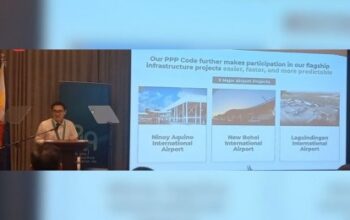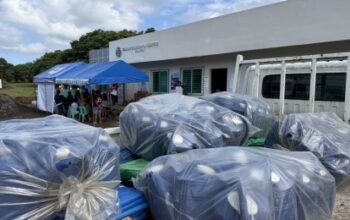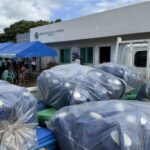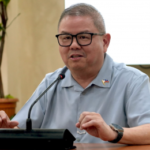The decline in the number of farmers, the growing age of existing farmers, decreasing productivity, and the shrinking of farm sizes all represent critical challenges facing our agricultural sector. These very real issues extend even to a secluded agricultural area in Baguio City, known as the Smith Valley Agriculture Cooperative (SVAC).
A Farm in the City
Smith Valley Agriculture Cooperative, is one of the few farming land that is still existing in Baguio City
Located in Benin Tam-awan, Barangay Pinsao Proper, Baguio City, the Smith Valley Agriculture Cooperative (SVAC) thrives on ancestral land belonging to an Ibaloi family. This indigenous ethnic group in the Cordillera region of the Philippines is known for their agricultural practices and rich cultural heritage.
The ancestral land, once spread across 30 hectares, now officially occupies 14 hectares due to some family members opting to sell their share of the property. It stands as one of the few remaining agricultural lands in Baguio City.
Old photo of Smith Family. (Photo courtesy by Marylyn Zarate)
The land is collectively owned by the Smiths, the Pistolas, and the Zarates. The name “Smith” might sound foreign, but it’s a result of linguistic adaptation. Originally “Ismek” or “Semek”, the name was anglicized to “Smith” during the American era in Baguio due to pronunciation difficulties.
Old photo of Smith Family. (Photo courtesy by Marylyn Zarate)
Old photo of Smith Family. (Photo courtesy by Marylyn Zarate)
Dominga Smith, the last surviving daughter of Marylyn’s great-grandfather Santiago Smith, (right) wearing the traditional “Devit ” Ibaloi clothes. Beside her on the left is her cousin, Angie Luna. Dominga passed away last February 29, 2020. (Photo courtesy by Marylyn Zarate)
Carrying forward the family legacy, Marylyn Zarate, one of the sixth-generation owners of the indigenous land of Smith Valley
Marylyn Zarate, one of the owners and the Chairman of the board of SVAC, was an overseas Filipino worker (OFW) who decided to return home and form a cooperative to protect their ancestral land. Today, the cooperative has 15 registered members and primarily cultivates chayote, while others grow potatoes, cabbages, cassavas, and tomatoes during the summer season. It also hosts livestock including rabbits, chickens, and swine, and produces local products such as atchara and chayote cake.
Smith Valley Agriculture Cooperative, primarily cultivates Chayote, because it is easy to grow and requires less maintenance
“Our grandmothers were the ones who gardened here before, this is where they got our food. Now, as time passed, they wanted to have the lots titled, so some were sold out. We decided to preserve the area so we came up with a decision to make it into a cooperative,” Marylyn said.
For Marylyn, protecting Smith Valley becomes more than just a duty – it’s a meaningful legacy to carry forward for future generations.
Technology: A Farmer’s New Best Friend
To modernize and enhance their operations, the Smith Valley cooperative partnered with the Filipino Inventors Society Cordillera Administrative Region (FISCAR). FISCAR organized a series of workshops to train the cooperative members in the use of agricultural technology. Following the training, FISCAR selected Smith Valley as the deployment site for their innovative technologies.
Luder Zarate, President of the Filipino Inventors’ Society in the Cordillera Administrative Region, is holding a solar panel, which forms part of an innovative self-cleaning solar panel system.
These initiatives have been supported by the Department of Science and Technology – Technology Application and Promotion Institute (DOST-TAPI) through the Incentives Program for Accredited Inventors’ Organization. As a result, Smith Valley now has access to a range of innovative tools including a portable grain dryer, a dehydrator, a food presser, and a flame thrower.
Atty. Israel Jacob Zaragoza, Head of DOST-TAPI’s Legal Unit, oversees the unit that facilitates the Incentives Program under the Inventors’ Accreditation
The Portable Grain Dryer possesses the ability to dry rice grains and coffee with incredible speed, bringing them to an optimal state for storage or further processing.
The portable grain dryer is a game-changer for the cooperative. Capable of drying 1 kilogram of rice grains in just a minute, it eliminates the need for traditional roadside drying that takes days and exposes the grains to environmental contamination.
The dehydrator offers a viable solution to the prevalent issue of overproduction to efficiently preserve excess produce and thereby prevent waste.
The dehydrator addresses Smith Valley’s problem in overproduction and the need for preserving their produce. Using an air circulation system, it can dry vegetables and meat to extend their shelf life.
The food presser has the capability to transform ground meat into perfectly formed cubes.
The food presser offers Smith Valley an opportunity to diversify their product range. With this tool, they can create chicken, beef, and even pork cubes, adding value to their produce and opening new avenues for income.
The Flame Thrower, when coupled with a plough, offers a remarkable capability of exterminating pests and bacteria, introducing a highly efficient and innovative solution to maintain crop health.
Lastly, the flame thrower is an innovative solution for preparing the soil for planting. By attaching it to a plough, it uses fire to eliminate pests and bacteria in the soil, ensuring a healthier and more productive environment for crops to grow.
Drawing Youth to Farming with Technology
In addition to enhancing Smith Valley through technological advancements, Marylyn aspires for these innovations to serve as a source of inspiration for the younger generation, encouraging them to carry on their tradition of farming.
The young generation of Smith Valley: Ronnel Smith (left) Ferdival Zarate (middle) and Ruel Smith (right)
Ferdival Zarate, one of Marylyn’s cousins, sees that technology can help in motivating the younger relatives in their family to pursue a career in farming.
“Now that new technologies have been introduced, we can see the opportunity, especially for those who are not pursuing their current courses, to return to farming,” Ferdival said.
A Vision for the Future
After the successful deployment last July 9, 2023, FISCAR plans to eventually hand over these technologies to Smith Valley to help them improve their land. They are also working on solving other problems in the area such as water supply.
Beyond preservation, Smith Valley hopes that their place will be an agricultural tourism spot in Baguio City in the near future.
“Baguio is a chartered city, and most people perceive it as a place without gardens or farms. Therefore, you wouldn’t typically find agricultural land there. Here in Smith Valley, what we really want to happen, aside from converting it to agricultural tourism to generate income, is to see it flourish,” Marylyn said
Meanwhile, DOST-TAPI Director, Atty. Marion Decena urges other inventors’ groups to organize similar initiatives and encourages the private sector to forge partnerships with government agencies like DOST-TAPI, to ensure that these kinds of technologies are effectively disseminated to the segments of the public who need them most.
DOST-TAPI Director, Atty. Marion Ivy D. Decena personally oversaw the deployment of FISCAR’s technologies in Smith Valley.
As we look to the future, the story of Smith Valley serves as a powerful reminder that the key to navigating the challenges of the present time lies in our ability to adapt and innovate. It is a call to action for other agricultural communities, inventors, private sector and government agencies to collaborate and harness the power of technology to create a sustainable and prosperous future for agriculture in the Philippines.










